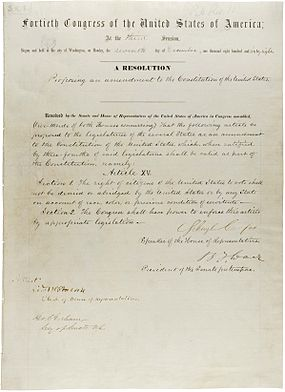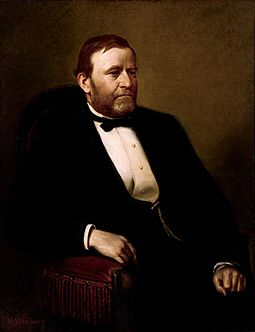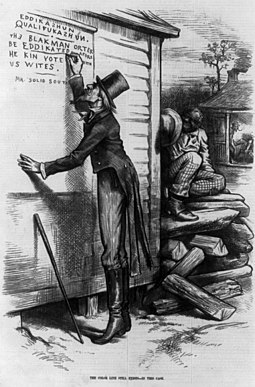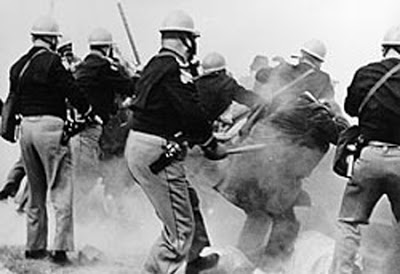Jessica Q.
Jessica Q.
Law 💼
8 resourcesSee Units
Establishing a Universal Right to Vote Under the 15th Amendment
Within the U.S. Constitution, you might've heard of the "Reconstruction Amendments," known as such because of the time period they were passed in. The 15th Amendment is among these three amendments. Let's dive deeper into what it actually means! 👋
According to the Constitution, the 15th Amendment, which was passed in 1870, reads:
Section 1:
The right of citizens of the United States to vote shall not be denied or abridged by the United States or by any State on account of race, color, or previous condition of servitude. 🌈
Section 2:
Congress shall have power to enforce this article by appropriate legislation. 🙆♀️

Okay, that was a lot of technical words. What exactly does all of that mean? 😥
The first section talks about how the right to vote CANNOT be taken away or hindered by race, ethnicity, skin color, or possible previous status as a slave. The second section says that Congress can ensure that this amendment applies by making laws that enforce it. 📜
Cool, now that we know the literal meaning of the amendment itself, what circumstances led to this amendment being included in the Constitution? Let’s get into the historical context behind this amendment and look more closely at the events leading up to its eventual passing! 👓
What Led Up to the Passing of the Amendment?
We're going to go back to the end of the Civil War (1865). During Reconstruction, the government tried to "reconstruct" the South by protecting the rights of newly-freed African Americans. At this time, the dominating question was: "who had the right to vote?" In other words, who deserved the privilege to vote? 💣👩🔧😲
Leaders like Susan B. Anthony and Frederick Douglass altered the American political landscape by spearheading suffrage movements and advocating for voting rights. 🗣
- Anthony, an advocate for women's suffrage, believed that since women are citizens, they should also have the right to vote. 👯♀️
- Douglass, an abolitionist (someone who wants slavery to end) and activist, believed that African Americans had done their part by fighting in the Civil War and earned the right to suffrage. 🤺
In the beginning, however, there was a lot of resistance. Northern states left the issue of voting rights for women and African Americans up to a popular vote, but none of the ballots regarding suffrage were passed. The Civil War was over, but racist and discriminatory views remained. 😡
Ulysses S. Grant, a Civil War Union general and 18th President of the US, initially did NOT (❌) support voting rights for African Americans. Nonetheless, as time passed, he saw the loyalty of African Americans to the Union; Grant recognized that the 15th Amendment would provide them with protection, as well as provide the US with more strength as it continued to chug along through Reconstruction. 🤗

President Ulysses S. Grant
The 15th Amendment was, then, ratified on February 3rd, 1870... but what happened afterward? Let’s take a look. 📯
What Happened After the Passing of the 15th Amendment? How Did it Affect the US?
Although the Amendment was successfully passed, it didn’t mean African Americans were immediately allowed to vote. Discriminatory practices were heavily used, especially in the South, to prevent black men from voting (women didn't have the right to vote, which would come much later with the 19th Amendment passed in 1920). ⚔️
These unfair practices included:
- Poll taxes 💸
- Literary tests 📝
- The grandfather clause, which stated that you could only vote if your grandfather had voted before (impossible for many black citizens, whose grandfathers had been slaves and unable to vote). 👴

Literacy tests
These unfair practices are collectively known as disenfranchisement, a term describing the use of laws to prevent a group of people from voting. 📑👎
Though the 15th Amendment wasn't wholly successful at providing voting rights for African Americans, it was still a considerable step forward for civil rights. 👣
- For example, African American communities in the South were able to elect the Republican Party, which implemented changes all across former Confederate states. 🙌
- Hiram Rhodes Revels was the first African American in the U.S. Congress. 1️⃣
- Hundreds of black men served in state legislatures and local offices. 🏢
Tying into the Civil Rights Movement…
Despite these significant changes, the fight for voter equality was still not over. During the Civil Rights Movement, many African Americans protested and marched for equal voting rights. In 1965, the Selma Marches were led that protested against the disenfranchisement of black citizens by Jim Crow laws. 🧨🚶♀️

Eventually, the 24th Amendment was passed in 1964 that prevented poll taxes. In 1965, the Voting Rights Act was passed, calling for greater enforcement of the right to vote for African Americans by prohibiting literacy tests and other unfair Jim Crow laws. The number of registered black voters increased from 23% to 61% after this act was passed (Library of Congress). 📚
Wrapping Up: Voting Rights Super Important!
Although the 15th Amendment plays a small role in today’s legal world, it’s still an essential reminder of the importance of the right to vote and the protection of that right. If any laws today are passed that impact a person’s right to vote because of their skin color, they would be violating the 15th Amendment, as held by the Supreme Court. ⛔️💖
Connect with other students studying Law with Hours 🤝
Browse Study Guides By Unit
👨⚖️Landmark Cases
📜The Amendments
📜Bill of Rights
The 1st Amendment
- Establishing a Universal Right to Vote Under the 15th Amendment
- What Led Up to the Passing of the Amendment? 👍
- What Happened After the Passing of the 15th Amendment? How Did it Affect the US? ⚖
- Tying into the Civil Rights Movement… 🎀
- Wrapping Up: Voting Rights = Super Important! 🤩
- Establishing Women's Right to Vote 📜
- Overview
- The Women’s Suffrage Movement 🗳️
- Famous Suffragists 👩⚖️
- Opposition to Women’s Suffrage 🪧
- The 5 basic rights established by the 1st Amendment
- Bill of Rights 📝
- Free Exercise of Religion 🙏
- Broad Interpretation 🌎
- Narrow Interpretation 🏠
- Literal Interpretation 🧍
- Employment Division v. Smith (1990) 💼
- Church of the Lukumi Babalu Aye, Inc. v. City of Hialeah (1993) 🐻
- Free Expression 💬
- Freedom to Assemble, Petition, and Associate ⚠️
- ...and That's a Wrap! 🌮

© 2023 Fiveable Inc. All rights reserved.